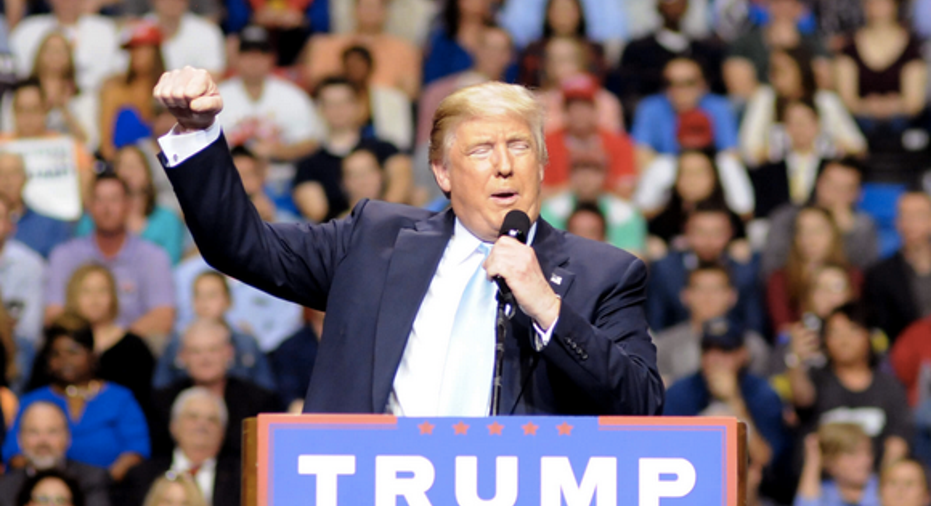Why the Tech Industry Is Worried About a Donald Trump Presidency

While President-elect Donald Trump has been a major presence on Twitter, he has acknowledged not actually posting the tweets himself.
The business leader crafts them, but generally says them out loud for a member of his staff to tweet. "During the day, I'm in the office, I just shout it out to one of the young ladies who are tremendous," he told CNN's Anderson Cooper in April.
In addition, the about-to-be commander in chief reportedly does not use a computer and he openly questioned spending tens of millions on digital ads to support his campaign, the The New York Times reported. That, plus Trump's well-publicized fights with Apple CEO Tim Cook and Amazon founder/CEO Jeff Bezos have made much of the tech industry wary of how a Trump presidency would impact their industry.
That's why in July, the day before Trump named Mike Pence as his running mate, more than 100 noted technology leaders wrote a letter condemning the president-elect's candidacy. The public post did not mince words, saying high up in the letter that "we have listened to Donald Trump over the past year and we have concluded ... Trump would be a disaster for innovation."
Trump has been very active on Twitter, although he does not post his own tweets. Image source: Donald J. Trump for President.
What is the technology industry worried about?
The letter clearly took issue with how Trump conducted his campaign. More directly, the letter's signatories, which included Apple co-founder Steve Wozniak, Twitter co-founder Ev Williams, Expedia Chairman Barry Diller, Reddit co-founder Alexis Ohanian, Slack co-founder Stewart Butterfield, and many more names from established companies as well as emerging players, called Trump out on immigration.
The letter also said that 40% of Fortune 500 companies were founded by immigrants or their children, expressing concerns that Trump had been "hostile" toward immigration.
The letter also brought up Trump's often-stated desire to shut down parts of the internet as a security strategy. The technology leaders who signed the letter wrote that Trump demonstrated "both poor judgment and ignorance about how technology works."
What will this mean for President Trump?
While Trump has clearly not embraced technology in his personal life the way his Oval Office predecessor, Barack Obama, has, he has been willing to adapt his policies. The next president has also expressed a willingness to listen to outside advisors. He has made statements about closing part of the internet, but in the same speech he also talked about going to see Bill Gates and a "lot of different people that really understand what's happening."
It's worth noting that Gates has not been a Trump supporter, but he would be a very reasonable person for the president-elect to consult. It's easy to see why so many tech leaders were concerned -- and likely are still very concerned -- but Trump, for all his bombast, has shown signs that while he's prone to speaking his mind and saying things that outrage people, he also speaks a little louder (sometimes maybe a lot louder) than he acts.
The election is over and the technology community can have a role in what happens next. That means being willing to work with someone as president that they did not support if he chooses to address their concerns.
Trump may be naive about how the internet actually works and he may never be the president who has meetings via virtual reality headset. But it's possible that the actual results will be better than these tech leaders feared, in part because they spoke out to express their concerns and the next president will have to address them or risk further alienating a powerful opposition.
A secret billion-dollar stock opportunity The world's biggest tech company forgot to show you something, but a few Wall Street analysts and the Fool didn't miss a beat: There's a small company that's powering their brand-new gadgets and the coming revolution in technology. And we think its stock price has nearly unlimited room to run for early-in-the-know investors! To be one of them, just click here.
Daniel Kline owns shares of Apple. He shares all of these fears and then some, but believes that people are better than we have shown. The Motley Fool owns shares of and recommends Apple and Twitter. The Motley Fool has the following options: long January 2018 $90 calls on Apple and short January 2018 $95 calls on Apple. Try any of our Foolish newsletter services free for 30 days. We Fools may not all hold the same opinions, but we all believe that considering a diverse range of insights makes us better investors. The Motley Fool has a disclosure policy.



















